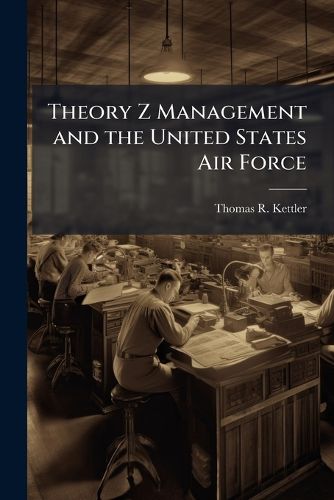Readings Newsletter
Become a Readings Member to make your shopping experience even easier.
Sign in or sign up for free!
You’re not far away from qualifying for FREE standard shipping within Australia
You’ve qualified for FREE standard shipping within Australia
The cart is loading…






People are the vital link to any organization's success. Success, however, is an improbable outcome unless proper management techniques are employed to motivate individuals to achieve organizational objectives. As the Air Force transitions into the 21st century, the nation's war-fighting and readiness capability rests with a force that faces budgetary, infrastructure, and personnel cutbacks. Given these constraints, a commander's ability to successfully accomplish a task or mission is directly related to the managerial techniques he or she employs to influence the human behavior of their people. One such technique, Theory Z management, is a concept proposed by William G. Ouchi, a professor at the Graduate School of Management at the University of California, Los Angeles. Theory Z management is an adaptation of traditional Japanese management principles to reflect American cultural values with the overall purpose of improving organizational performance, worker motivation, and the relationships between the worker and the manager. This paper will discuss the cultural basis for traditional Japanese management theory, the principles of Theory Z management, some opposing views of Theory Z management principles, and how Theory Z management practices can be adapted to the United States Air Force. Theory Z methodologies offer commanders alternatives to more traditional managerial approaches designed to motivate subordinates and complement the current Air Force focus on quality.
This work has been selected by scholars as being culturally important, and is part of the knowledge base of civilization as we know it. This work was reproduced from the original artifact, and remains as true to the original work as possible. Therefore, you will see the original copyright references, library stamps (as most of these works have been housed in our most important libraries around the world), and other notations in the work.
This work is in the public domain in the United States of America, and possibly other nations. Within the United States, you may freely copy and distribute this work, as no entity (individual or corporate) has a copyright on the body of the work.
As a reproduction of a historical artifact, this work may contain missing or blurred pages, poor pictures, errant marks, etc. Scholars believe, and we concur, that this work is important enough to be preserved, reproduced, and made generally available to the public. We appreciate your support of the preservation process, and thank you for being an important part of keeping this knowledge alive and relevant.
$9.00 standard shipping within Australia
FREE standard shipping within Australia for orders over $100.00
Express & International shipping calculated at checkout
Stock availability can be subject to change without notice. We recommend calling the shop or contacting our online team to check availability of low stock items. Please see our Shopping Online page for more details.
People are the vital link to any organization's success. Success, however, is an improbable outcome unless proper management techniques are employed to motivate individuals to achieve organizational objectives. As the Air Force transitions into the 21st century, the nation's war-fighting and readiness capability rests with a force that faces budgetary, infrastructure, and personnel cutbacks. Given these constraints, a commander's ability to successfully accomplish a task or mission is directly related to the managerial techniques he or she employs to influence the human behavior of their people. One such technique, Theory Z management, is a concept proposed by William G. Ouchi, a professor at the Graduate School of Management at the University of California, Los Angeles. Theory Z management is an adaptation of traditional Japanese management principles to reflect American cultural values with the overall purpose of improving organizational performance, worker motivation, and the relationships between the worker and the manager. This paper will discuss the cultural basis for traditional Japanese management theory, the principles of Theory Z management, some opposing views of Theory Z management principles, and how Theory Z management practices can be adapted to the United States Air Force. Theory Z methodologies offer commanders alternatives to more traditional managerial approaches designed to motivate subordinates and complement the current Air Force focus on quality.
This work has been selected by scholars as being culturally important, and is part of the knowledge base of civilization as we know it. This work was reproduced from the original artifact, and remains as true to the original work as possible. Therefore, you will see the original copyright references, library stamps (as most of these works have been housed in our most important libraries around the world), and other notations in the work.
This work is in the public domain in the United States of America, and possibly other nations. Within the United States, you may freely copy and distribute this work, as no entity (individual or corporate) has a copyright on the body of the work.
As a reproduction of a historical artifact, this work may contain missing or blurred pages, poor pictures, errant marks, etc. Scholars believe, and we concur, that this work is important enough to be preserved, reproduced, and made generally available to the public. We appreciate your support of the preservation process, and thank you for being an important part of keeping this knowledge alive and relevant.